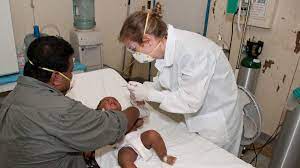Pediatricians are physicians who specialize in taking care of children and teenagers. If you’re interested in becoming a pediatrician, knowing the specific skills required for the role can improve your career prospects. Being familiar with the most important pediatrician skills can be an important career move, so it’s important to take the time to research them. In this article, we discuss what pediatricians are, explain what they do, and provide a list of the most important skills for the role.
Recommended
What do Pediatricians do?

A pediatrician’s role is to observe and treat growing children and teenagers while also advising their parents or legal guardians regarding the available courses of action if any issues arise. Some of their typical duties include:
-
Reporting any unusual developments regarding a child’s health to their parents or legal guardians
-
Helping children and teenagers get over the emotional distress associated with visiting the doctor’s office
-
Diagnosing various illnesses based on their patient’s symptoms
-
Prescribing appropriate medication while taking into consideration the child’s health issue, health condition, and overall development
-
Ordering the necessary tests depending on the patient’s symptoms
-
Interpreting laboratory results indicating their patient’s health condition or response to treatment
-
Recommending specialized health care when faced with a highly complex health issue
-
Being fully aware of the legal requirements and guidelines regarding interactions with minors
9 Pediatrician skills
Here are nine of the most important skills for pediatricians to help you prepare for the role:
1. Communication
As opposed to other types of physicians who usually discuss medical issues directly with their patients, pediatricians need to communicate well with both the children and their parents. When communicating with the children, they need to be able to make them comfortable and help them understand their ailments, and they must also watch for potential nonverbal cues. When communicating with parents and legal guardians, they need to be able to properly explain both the illness and the treatment options, giving the child’s caretakers enough information to make an informed decision.
2. Problem-solving
Although pediatricians usually spend most of their work time treating common illnesses, they need to be able to assess every one of them independently and come up with personalized solutions. Children tend to react differently to similar issues and pediatricians need to quickly assess the reported symptoms, thoroughly analyze the issue, and provide a solution as quickly and accurately as possible. This requires a problem-solving skill set, which usually includes the ability to focus, research, and analyze situations.
3. Ability to relate to children
Although the role of a pediatrician seems similar to that of a regular physician and the two share many required skills, pediatricians need to have a natural ability to interact with children. Many children are afraid to visit the doctor’s office, and once there, they may also be intimidated by elements like needles and tests. A pediatrician needs to be able to relate to children and help them relax by making them feel at ease with their environment.
4. Health care
As with any type of physician, pediatricians need to have excellent healthcare-related knowledge and abilities. They need to have extensive information on all potential health issues that their patients may suffer from, including how to diagnose them, ease the discomfort associated with them, and treat them. Besides having a solid knowledge base, pediatricians need to constantly stay up to date with the latest developments in the field throughout their careers.
RECOMMENDED: BEST ONLINE NUTRITION DEGREES
5. Teamwork
A significant number of pediatricians work in teams, which can include nurses, fellow pediatricians, and other medical professionals. They need to be able to share some responsibilities with other members of the medical staff in a way that improves the odds of a medical process being as quick and effective as possible. They may also need to collaborate with specialists for more complex health issues and should be able to provide them with quality information and guidance regarding the specifics of each issue.
6. Organization
Besides health services, pediatricians also need to perform other related tasks, like handling patient paperwork, taking patient or parent phone calls, studying new medical developments, performing research, and analyzing laboratory results. Given the fact that their time is limited, they need to be able to efficiently organize their schedule according to priority and availability. They may also need to organize other professionals’ schedules and priorities, like nurses or personal assistants.
7. Awareness of different cultures and traditions
Pediatricians working in different settings and geographical regions often interact with patients and guardians from different backgrounds. In order to perform their job at high standards, they need to be able to interact with everyone, regardless of culture, nationality or any other similar trait. Besides being able to communicate with people who aren’t able to speak fluent English, pediatricians also need to be aware of various cultural differences when treating children.
8. Empathy
Most physicians need empathy to perform their jobs well, but it’s especially important in the case of pediatricians. Children are significantly less tolerant of physical pain and emotional distress than adults, and the pediatrician should be aware of this and take active steps to minimize these negative effects. This also helps them professionally, as children are usually more likely to communicate effectively with an adult who seems to understand them.
9. Attention to detail
Due to the difficulties that some children may have when expressing their symptoms, strong communication skills are sometimes not enough for a pediatrician to identify the illness. When children are too distressed to express what they’re feeling or when they simply lack the vocabulary to do it, the pediatrician needs to be able to notice even seemingly unimportant details that may help them accurately diagnose a certain medical issue.
I hope you find this article helpful.